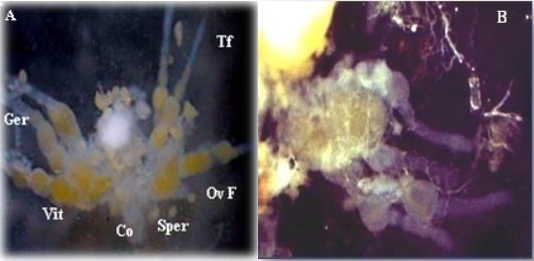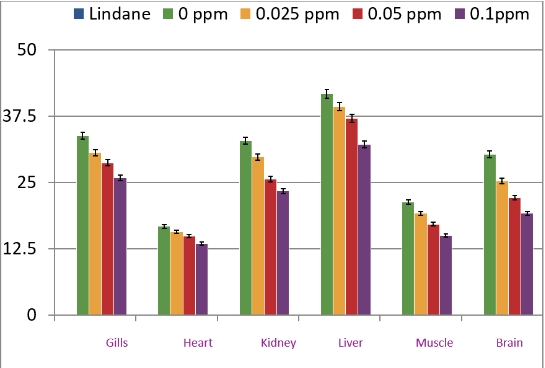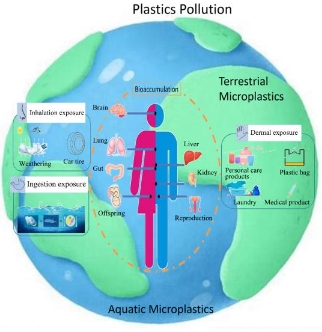Toxicity of agrochemicals: Impact on environment and human health
Abstract
Agrochemicals, while essential for increasing agricultural yields and pest control, have unintended consequences. They contaminate soil and water, disrupting ecosystems, reducing biodiversity, and threatening aquatic life. Furthermore, agrochemicals harm non-target organisms, disrupting ecological balance. On the human health front, farmworkers and pesticide applicators face acute poisoning risks, with symptoms ranging from discomfort to severe illness or death. Chronic health effects include links to cancer, neurological disorders, and reproductive problems, raising concerns about food safety and worker well-being. Addressing agrochemical toxicity requires a multifaceted approach. Governments must enforce strict regulations to minimize environmental contamination and ensure safe handling practices. The agricultural industry can adopt sustainable methods like integrated pest management (IPM) and organic farming to reduce reliance on agrochemicals. Innovations such as precision agriculture, biological pest control, nanotechnology, and artificial intelligence for early risk detection are essential. Collaboration among stakeholders is critical for a more sustainable and environmentally friendly agriculture sector, involving regulatory measures like maximum residue limits (MRLs) and sustainable practices like IPM and organic farming. In summary, this review highlights the urgent need to address agrochemical toxicity holistically, balancing agricultural productivity with environmental and health concerns to ensure a sustainable future for agriculture and the planet.
References
[1]Sekhotha M, Monyeki K, Sibuyi M. Exposure to Agrochemicals and Cardiovascular Disease: A Review. International Journal of Environmental Research and Public Health. 2016; 13(2): 229. doi: 10.3390/ijerph13020229
[2]Anaduaka EG, Uchendu NO, Asomadu RO, et al. Widespread use of toxic agrochemicals and pesticides for agricultural products storage in Africa and developing countries: Possible panacea for ecotoxicology and health implications. Heliyon. 2023; 9(4): e15173. doi: 10.1016/j.heliyon.2023.e15173
[3]Rossetti MF, Stoker C, Ramos JG. Agrochemicals and neurogenesis. Molecular and Cellular Endocrinology. 2020; 510: 110820. doi: 10.1016/j.mce.2020.110820
[4]Said M. An Overview of Impact of Agrochemicals on Human Health and Natural Environment. Scientific Research Communications. 2023; 3(2): 32-39. doi: 10.52460/src.2023.009
[5]Hossain ME, Shahruk , Hossain, SA. Chemical Fertilizers and Pesticides: Impacts on Soil Degradation, Groundwater, and Human Health in Bangladesh. 2022. pp. 63-92. doi: 10.1007/978-3-030-95542-7_4
[6]Malik Z, Ahmad M, Abassi GH, et al. Agrochemicals and soil microbes: Interaction for soil health. In: Hashmi MZ, Kumar V, Varma A (editors). Xenobiotics in the Soil Environment. Springer; 2017. pp. 139-152. doi: 10.1007/978-3-319-47744-2_11
[7]Mandal A, Sarkar B, Mandal S, et al. Impact of agrochemicals on soil health. In: Prasad MNV (editor). Agrochemicals Detection, Treatment and Remediation: Pesticides and Chemical Fertilizers. Butterworth-Heinemann; 2020. pp. 161-187. doi: 10.1016/b978-0-08-103017-2.00007-6
[8]Kaur T, Sinha AK. Pesticides in Agricultural Run Offs Affecting Water Resources: A Study of Punjab (India). Agricultural Sciences. 2019; 10(10): 1381-1395. doi: 10.4236/as.2019.1010101
[9]Syafrudin M, Kristanti RA, Yuniarto A, et al. Pesticides in Drinking Water—A Review. International Journal of Environmental Research and Public Health. 2021; 18(2): 468. doi: 10.3390/ijerph18020468
[10]Bailey A, Meyer L, Pettingell N, et al. Agricultural practices contributing to aquatic dead zones. In: Bauddh K, Kumar S, Singh RP, Korstad J (editors). Ecological and Practical Applications for Sustainable Agriculture. Springer Singapore; 2020. pp. 373-393. doi: 10.1007/978-981-15-3372-3_17
[11]Upholt WM, Kraybill HF. Ecological effects of pesticides. Annals of the New York Academy of Sciences. 1969; 160(1): 55-60. doi: 10.1111/j.1749-6632.1969.tb15823.x
[12]Nicolopoulou-Stamati P, Maipas S, Kotampasi C, et al. Chemical Pesticides and Human Health: The Urgent Need for a New Concept in Agriculture. Frontiers in Public Health. 2016; 4. doi: 10.3389/fpubh.2016.00148
[13]Popp J, Pető K, Nagy J. Pesticide productivity and food security. A review. Agronomy for Sustainable Development. 2012; 33(1): 243-255. doi: 10.1007/s13593-012-0105-x
[14]Singh A, Dhiman N, Kar AK, et al. Advances in controlled release pesticide formulations: Prospects to safer integrated pest management and sustainable agriculture. Journal of Hazardous Materials. 2020; 385: 121525. doi: 10.1016/j.jhazmat.2019.121525
[15]Nuruzzaman Md, Rahman MM, Liu Y, et al. Nanoencapsulation, Nano-guard for Pesticides: A New Window for Safe Application. Journal of Agricultural and Food Chemistry. 2016; 64(7): 1447-1483. doi: 10.1021/acs.jafc.5b05214
[16]Menz J, Modrzejewski D, Hartung F, et al. Genome Edited Crops Touch the Market: A View on the Global Development and Regulatory Environment. Frontiers in Plant Science. 2020; 11. doi: 10.3389/fpls.2020.586027
[17]Jadav NK, Rathod T, Gupta R, et al. Blockchain and artificial intelligence-empowered smart agriculture framework for maximizing human life expectancy. Computers and Electrical Engineering. 2023; 105: 108486. doi: 10.1016/j.compeleceng.2022.108486
[18]Soni M, Anjaria P, Koringa P. The revolutionary impact of ChatGPT: Advances in biomedicine and redefining healthcare with large language models. Future Medicine AI. 2023; 1(1). doi: 10.2217/fmai-2023-0011
[19]Anjaria P, Asediya V, Bhavsar P, et al. Artificial Intelligence in Public Health: Revolutionizing Epidemiological Surveillance for Pandemic Preparedness and Equitable Vaccine Access. Vaccines. 2023; 11(7): 1154. doi: 10.3390/vaccines11071154
[20]Asediya V, Anjaria P. Quantum leap: is the conflux of artificial intelligence, personalized medicine, nutrigenetics and nutrigenomics the path to optimal health? Epigenomics. 2023; 15(7): 397-400. doi: 10.2217/epi-2023-0084
Copyright (c) 2024 Pranav Anjaria, Sanjay Vaghela

This work is licensed under a Creative Commons Attribution 4.0 International License.








